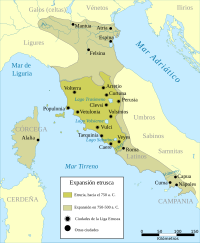Etruria
Etruria, also frequently called in Greek and Latin texts Tyrrhenia or Tirrenia, was an ancient historical region located in central Italy, in the regions of Tuscany, Lazio and Umbria. The place name derives from the Etruscans or Tyrrhenians, the settlers who settled there creating a powerful confederation, the so-called Etruscan dodecapolis.
It was such a confederation of the major independent city-states of central and northern Italy, until its fall to Rome in the 18th century IV a. c.
Etruria was dominant in the Italian peninsula from the year 650 B.C. C. Its expansion included the valley of the river Po, and extended to the Greek colonies located in southern Italy.
Influence on the Roman Republic
Etruscan kings conquered and ruled Rome for a century, until in 509 B.C. C. the last Etruscan king Tarquinio the Proud was expelled and the Roman Republic was established.
The Etruscans are believed to be responsible for transforming Rome from a small town to a large city. They are also responsible for creating Rome's first great thoroughfare, the Via Sacra, as well as temples and markets.
The Etruscans greatly influenced the spread of Greek culture in Rome, the gods of Olympus, and the Latin alphabet (taken from the Greek alphabet). It would significantly influence the marked superstitious character of the Roman people.
From the IV century B.C. C., Etruria was gradually absorbed by the Roman Republic, and the Etruscans, like all other Italics, federated by the Romans, thus definitely becoming an integral part of Roman Italy.
Between 1801 and 1807 Napoleon Bonaparte created the vassal state called the Kingdom of Etruria that included the Duchy of Parma and the Grand Duchy of Tuscany.
Contenido relacionado
Paco and Veva
Futurama
John Grierson
Palm d'or
All the president's men


